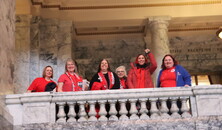This Week in Olympia

Week 3
January 25-29
McCleary
On Monday, with a 64 to 36 bipartisan effort, the full House passed ESHB 2366, the plan to meet McCleary obligations in 2017.
Almost immediately, Sen. Steve Litzow, (R, LD 41), chair of the Senate’s Early Learning/K-12 Education committee, said he’d block the bill in the Senate unless they change two key provisions – the 2017 deadline to comply with McCleary, and a provision regarding state funding for classrooms to accommodate all-day kindergarten and class-size reductions for K-3.
The Senate Education committee had heard the companion bill, SB 6195, last week. Thursday it was amended to address Litzow’s demands, where it passed out of committee on a party line vote. Sens. Billig, McAuliffe and Rolfes spoke in strong opposition.
Perhaps it was best summed up by Sen. Rolfes who said, “The bill as amended makes zero commitments.”
Testing
SHB 2214 would require students who do not pass SBAC tests in the 11th grade to retake a course in the 12th grade or complete a dual credit course in the content area not passed — essentially keeping status quo that when kids fail the test they have to take alternatives to the test in order to graduate. The bill would delink the biology end-of-course test from graduation requirements and remove the 10th grade SBAC test and associated alternatives.
WEA opposes this bill because it is not a complete delink and because it is unfeasible to use test scores for course scheduling when the scores become available as late as October. Not to mention that the uneven administration of the tests calls into question the validity of results for use in high stakes decisions. The bill passed the full House.
HB 2429 would mandate SBAC test scores be available to parents and students by June 15. A teacher and two counselors testified that they are already registering students for NEXT year’s classes. Even OSPI said it isn’t realistic that scores will be available by June 15 and wasn’t clear as to when they could be guaranteed.
WEA supported the bill and testified that if there is a mandated date, and the scores aren’t available, those test scores should not be used to penalize students or for other high-stakes consequences. WEA continues to advocate for a mix of teacher assessments, course grades, and other timely and valid evidence of success as tools to indicate the need for additional student support rather than single test scores.
HB 2556 Similar to SHB 2214, this bill mandates that the SBAC test scores be used to send kids who fail the test into remedial courses in order to graduate. WEA opposed the bill for the same reason as we opposed SHB 2214. Incredibly, the Business Roundtable testified that test scores should be the only tool to determine graduation and that coursework is never an adequate measure of a student’s ability. This bill is still in the House Education committee.
HB 2734 delinks the biology end-of-course exam permanently, or until a new comprehensive science test is available, at which time the use of the test for graduation requirement will be reconsidered. WEA supported this bill, but asked that it go further and delink all the SBAC tests from graduation requirements. This bill was voted out of House Education committee.
Best Testing Bill Out There:
The WEA-initiated bill, HB 2670 would delink all standardized tests from graduation requirements, hold opt-out students harmless, and create a system where focus is on teacher-driven assessments, more teaching and learning, and less testing. No hearing has been scheduled.
Prime sponsor Rep. Jesse Young (R, LD 26) took to the airwaves on Wednesday to promote HB 2670, which we call “the Student Testing Bill of Rights.”
Young said, “This bill would promote respect for the professional judgment of our teachers who are trained and hired to assess our students on a daily basis and who know our students’ strengths and weaknesses. We want our students to be motivated and engaged in their educational learning and not bogged down by a system that forces them to take test after test with no real time to actually learn.”
Higher Ed
AHE Chair Carla Naccarato-Sinclair, Tobi Rosenberg, an adjunct professor from Bellevue College, and several other faculty members from AFT, testified in favor of HB 2615 on Tuesday at the House Higher Education committee meeting. The bill would convert part-time positions to full time to improve pay and benefits for two-year college faculty. It is scheduled to be voted out of the committee sometime before policy cutoff on Feb. 5.
Teacher shortage
The House and Senate both heard various teacher shortage bills including Randy Dorn’s.
In all cases, WEA stressed that solving the teacher shortage will require restoring respect for the profession, improving professional pay, and reducing class sizes and workloads.
There are aspects of the bills WEA supports and opposes. Ideas we support include:
- A central or regional depository for teacher applications.
- Providing training and assistance to HR departments in regards to best practices for recruitment, hiring and forecasting future employment needs.
- Increasing conditional loans for alternative route to certification, loan forgiveness in general for teachers, and addressing the high cost of required assessments in pre-service programs.
We oppose recommendations that would:
- Give signing bonuses to some teachers.
- Lowering licensure standards for some teachers.
SB 6241 had a hearing, which includes the governor’s proposal to increase starting pay to $40,000, provide a 1% pay raise to all other school employees, and add $5 million to expand the teacher mentoring program to more districts. No vote held yet in the Senate. The House will hear it on Monday.
2SHB 1737 passed out of the House by a nearly unanimous vote (96 Yea; 1 Nay; 1 Excused). The bill would allow retirees who retired early using the 2008 Early Retirement Factors to work as substitutes for up to 630 hours per year until August 2020.
Paraeducators
SB 6408 was heard in committee on Thursday. Cathy Smith, ESP At-Large representative on the WEA Board, testified in opposition.
WEA supports the recommended standards and professional development being proposed, but we strongly oppose the required certification. As Cathy stated, “We are concerned that when the certification piece kicks in, that our paraeducators, who often start around $13.80 an hour will not find professional development accessible or affordable.”
WEA will continue to oppose the bill while working to ensure it is fully funded if it continues through the legislative process.
Coming up Next Week:
Educator Pay
HB 2472 - the House Appropriations committee will hear this bill on Monday regarding the proposed increase for new educator pay and to expand the mentoring program.
Higher Ed
HB 2615 - this bill, which converts part-time positions to full time to improve pay and benefits for two-year college faculty, will likely be moved to House Appropriations next week.
Free Community College
HB 2820, the “Washington Promise Program,” which provides for universal and affordable access to community and technical colleges for all Washingtonians, will be heard in House Higher Education on Wednesday. A similar Senate bill has not been scheduled in that chamber’s Higher Education committee. We don’t expect this bill to go anywhere this year.
First Policy Cutoff
Friday is the first policy cutoff of the session. That means that all bills that will move forward must be out of committee by that time. That means there will be a lot of bills being heard.


